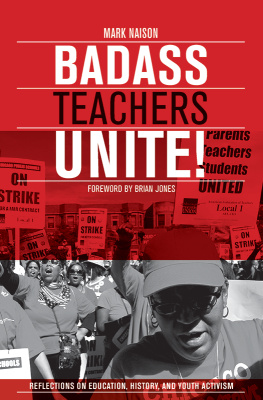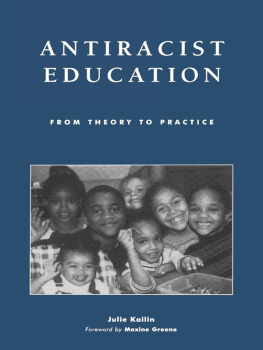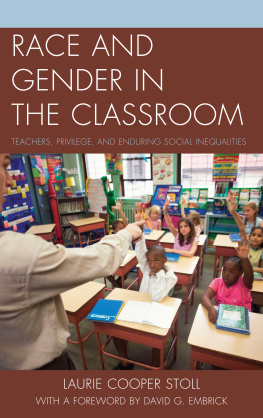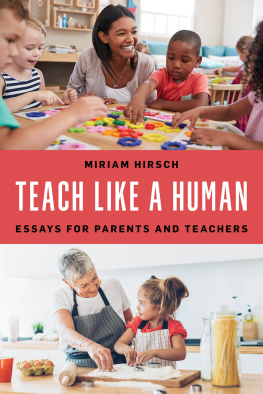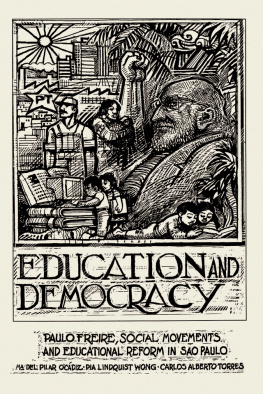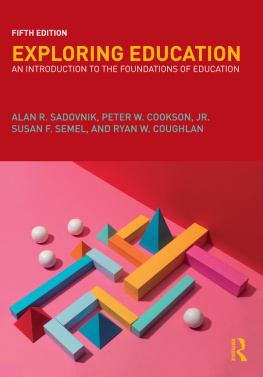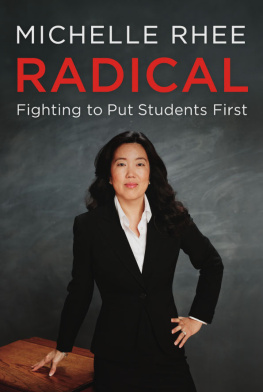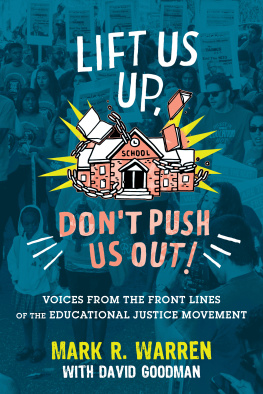Contents
MONDAY, OCTOBER 26, 2009
My Thoughts on Educational Reform
Speaking on behalf of students, especially students of color, an entire generation of self-described educational reformers have systematically undermined the teaching profession making graduation rates and performance on standardized tests the primary measures of value in classrooms. Has this educational revolution, now in progress for almost fifteen years, contributed to greater economic and social equality in the United States?
The statistics show otherwise. The wealth gap in the nation and in New York City has continued to widen despite the imposition of a test-centered approach to public education. Trying to achieve social equality through public education when tax, health care, and investment policies move in opposite directions, is proving to be a fools errand.
Not only isnt it working economically, it is putting students from poor and working-class families at a disadvantage by forcing creativity and critical thinking skills out of the classroom in favor of skills easily measured on standardized tests. From an administrative standpoint, it all makes senselets look for results that can be easily measured. From the teachers standpoint, it looks like a conspiracy to remove creativity and agency from their practice, while creating a new class of administrators who view teachers as pieces on a chessboard.
Introduction
During the last ten years, many people have stepped forward to denounce the bipartisan crusade to privatize public education and force it to operate according to business principles. Most have been teachers, school administrators, and education scholarspeople whose lives have been spent in the nations public schools, and whose lifes work has been put in jeopardy by the new policies. I came to education activism by a different path.
I am a scholar in African American and labor history, and a longtime coach and community organizer, who found himself working regularly in public schools as a result of a community history initiative I started called the Bronx African American History Project. Starting in 2004, when a social studies coordinator named Phil Panaritis discovered my research and decided to promote it to Bronx teachers and principals, I found myself giving lectures, workshops, and tours to teachers, students, and administrators in more than thirty Bronx schools, and eventually hired to lead two-month community history projects in thirteen elementary schools, middle schools, and high schools. Never, in forty-plus years of teaching and scholarship, did I see research I had done be transformed so creatively, largely by the teachers to whom I made presentations. They leaped upon the chance to get their students to see themselves, and their families, as historical subjects and create films, plays, and exhibits that brought their neighborhoods to life.
Then, with startling suddenness, the projects I was involved in were pushed out of the local schools, and the wonderful teachers I had worked with made targets of a campaign of demonization by elected officials and the media. The main culprit here was the Bloomberg administration, which began a program of school grading and school closures based on student test scores that put every Bronx school on notice that it had best emphasize test prep to the exclusion of anything else. But this approach was also pushed hard by the newly elected Obama administration as part of its Race to the Top initiative, and had virtually unanimous support from the press. Not only was the most successful education initiative I had ever worked on being shut down but teachers and principals whom I had most come to admire were being browbeaten, intimidated, micromanaged, and threatened with loss of employment if they didnt do something dramatic to raise test scores. Worse yet, these incredibly hard-working, courageous peoplemany of whom grew up in the same neighborhoods they taught inwere being blamed for the alleged failures of public schools and the failure of the nation to reduce poverty and inequality.
Although I had never before written about education policy, and had no background as an education researcher, I could not remain silent in the face of what I perceived as a catastrophe for Bronx schools and neighborhoods, especially since the teachers and principals under attack could not speak out on their own behalf without risking their jobs. So I wrote an essay titled In Defense of Public School Teachers based on my experience in Bronx schools, posted it on my blog, and sent it around to a small number of activists and scholars I regularly corresponded with [editors note: the essay is reprinted in this book in part one]. Very quickly, the piece went viral. I began receiving one heartbreaking message after another from public school teachersin New York and from around the nationwho felt that the whole nation had ganged up on them, and their ability to teach their students was being systematically undermined by policy makers who thought schools should be run like businesses. In their minds, bad teachers were causing the United States to fall behind other nations in educational performance.
The more I communicated with teachersespecially those located in schools in high-poverty communitiesand with my wife, a principal in a high-performing school in Brooklyn in no danger of being closed but was still deluged with burdensome tests and assessments, the more I became convinced that a policy catastrophe of unprecedented proportions was unfolding in education. As a historian of social movements, and as a participant in some of the great justice movements of the last half of the twentieth century, I felt I had a responsibility to challenge these new policies, put them in historical context, and strip away policymakers claims to be motivated by concerns for reducing racial and economic inequality. And here, I came upon an incredible and infuriating irony. The more I looked into the new policiesjudging schools and teachers on the basis of test scores; closing allegedly failing schools; taking power away from elected school boards and teachers unions; giving extreme preference to charter schoolsthe more I saw that they were designed to benefit powerful business leaders whose wealth had grown incrementally in the last thirty years. Despite egalitarian pretensions, school reform was a preeminently elite strategy designed to weaken the public sector, and open it up to private control and private investment.
There were others who were saying this, but I had firsthand knowledge through my research and my own experiences of schools in the Bronx over the last seventy years. I knew what kinds of programs and pedagogies had engaged and failed to engage working-class students and children of color who had attended those schools. More than one hundred of the three hundredplus oral history interviews we conducted for the Bronx African American History Project dealt with school experiences, in some cases going back to the late 1930s and early 1940s, and these accounts provided a rich resource and enabled us to put current reform efforts in historical context. There were more than a few success stories in these narratives. What had worked to motivate and engage Bronx students of color, past and present, often derived from elements deemphasized by the current generation of school reformersarts, music, sports, after-school programs, and teacher mentoring. Schools in the Bronx, when they worked the best, were round-the-clock community centers open from dawn to dusk, with teachers or coaches whose personal intervention often had greater, lasting, positive effects on students than classroom instruction designed to prepare for a test. Everything I had learned from my interview subjects, several of whom went on to be teachers, principals, and school superintendents, challenged the idea that punishing and rewarding teachers on the basis of student test scores would be the best way to improve schools in low- and moderate-income neighborhoods. So I began to write about what kind of programs could improve schools in communities of color, and critique those that I thought would make them worse. I was horrified to discover that virtually nothing I suggested had the slightest bit of currency with those making education policy at the local, state, or national level.
Next page
